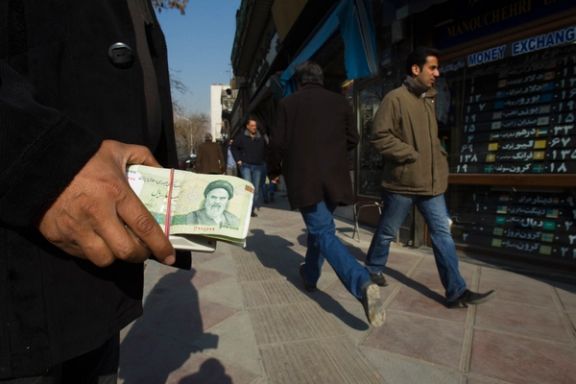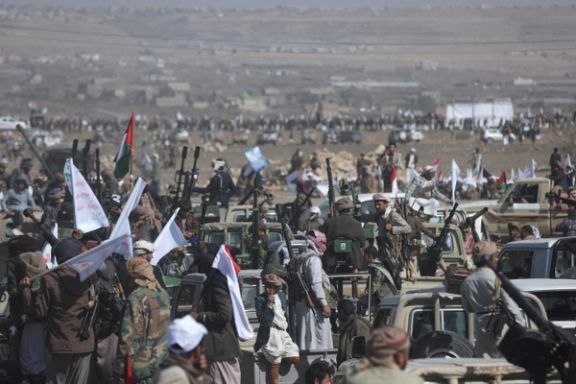US-Backed Kurdish Fighters Killed In Syria Drone Strike

Iranian proxies are alleged to have killed six fighters from US-backed Kurdish forces after a drone strike targeted a military academy in a US base near the Al Omar oil field in Syria.

Iranian proxies are alleged to have killed six fighters from US-backed Kurdish forces after a drone strike targeted a military academy in a US base near the Al Omar oil field in Syria.
The drone strike is believed to have originated from areas under Syrian government control in Deir al Zor and where Iran-backed militia are known to operate and launch such attacks.
The incident unfolds amidst heightened tensions in the region, with Iran-backed groups expressing solidarity with Palestinians amid escalating conflict between Israel and Hamas. Across the Middle East, Iran's militias in Lebanon, Syria, Iraq and Yemen have launched attacks on Israel and the US since October 7.
Iran-backed Hamas invaded Israel on the most deadly single day for Jews since the Holocaust, sparking a bitter response from Israel which has led to a wider regional conflict.
In response to an attack in Jordan that claimed the lives of three US soldiers and injured dozens more, this weekend saw attacks launched against Iran-affiliated targets in Yemen, Iraq and Syria. It comes after more than 160 attacks have been launched on US targets since October 7 alone, as a response to US support for Israel's right to defend itself in the wake of the October 7 atrocities.

There seems to be a deep sense of insecurity among Iranians due to intense conflicts in the Middle East and a high level of tensions with the United States.
Iranians on social media express their worries every morning about a potential war in the region that could drag Iran into fire. They also discuss a growing economic crisis that is making life increasingly difficult, even for those who are considered well-off.
One of the ongoing concerns is about US responses to Houthi strikes on commercial shipping and attacks by Iranian proxy groups on US forces, that last week left three US soldiers dead in the border area between Syria and Jordan.
Asghar Zargar, a lecturer on international relations, told centrist Entekhab website that "It is unlikely the US would strike Iran." He added that that the United States will not do anything that would threaten the security of the Persian Gulf as Washington does not want to see oil prices rising. However, Zargar noted that if Iran comes under attack, Tehran will launch a heavy retaliatory operation, targeting ships within the range of Iranian forces.
Last week, the looming shadow of a war involving Iran led to an extraordinary rise in exchange rates, bringing the price of every US dollar close to 600,000 Iranian rials.

Zargar further explained that now with insecurity in the Red Sea region, the United States will not risk threatening the security of the Persian Gulf. On the other hand, the Americans are aware that Iran will not remain silent if its territory comes under attack, which would set the Persian Gulf ablaze.
For ordinary Iranians, however, it is not a matter of pride or military might. It is a matter of life and death and survival under pressure.
The pressure from America, is not the only threat perceived by Iranians. The former head of the parliament's National Security and Foreign Relations Committee, Heshmatollah Falahatpisheh said last week, "The Russians have made Iran their accomplice and partner in crime in their war in Ukraine."
Falahatpisheh added that "From Syria to Palestine, the Russians position on Iran's strategic depth has been one of treason. They wanted Iran to be their partner in crime and that is why they said that they get their drones from Iran."
Iran’s militant proxy forces in Iraq and Syria have launched more than 160 rocket and drone attacks on US forces since mid-October. Zargar, who lives in Tehran and must be mindful of his public statements, noted that US forces have faced attacks in the region since 2003, with approximately 4,000 US troops losing their lives in military operations. However, the recent deaths of three US soldiers have heightened American sensitivity to such incidents. Still, Zargar suggested that the US is more likely to attack Iran's interests in the region rather than striking targets within Iran.
Highlighting the danger of Iranian officials and commanders focusing on missile development and using them against neighbors, former Foreign Minister Javad Zarif quoted former President and Expediency Council Chief Akbar Hashemi Rafsanjani, who said, "Missiles are good but they are not the answer to every problem." Zarif added that in today's world, there are multiple sources of power, and Iran should recognize its area of relative superiority in the international arena. He suggested that Iran advocate the idea of a cease-fire in the Gaza war to reduce international pressure on Tehran.
Zarif added: "In today's world there are multiple sources of power, but we have still not recognized our area of relative superiority," meaning that officials and commanders should not be deceived by their own words about Tehran's massive missile power.

Iran utilized two major UK banks to clandestinely transfer funds globally as part of an extensive sanctions-evasion plot.
Documents reviewed by the Financial Times reveal that British front companies, covertly owned by a sanctioned Iranian petrochemicals firm located near Buckingham Palace, held accounts with the banks, Santander and Lloyd’s.
The state-controlled Petrochemical Commercial Company (PCC), a central figure in the scheme, is accused by the US of raising substantial sums for the Iranian Revolutionary Guards Quds Force and collaborating with Russian intelligence to fund Iranian proxy militias. Both PCC and its UK subsidiary, PCC UK, have been subject to US sanctions since November 2018.
Recent disclosures about the sanctions-evasion operation in the heart of London, emerge following the Royal Air Force's participation in US airstrikes against Iranian-backed Houthi rebels in Yemen. Additionally, both the UK and US have imposed sanctions on what they describe as a "transnational assassinations network" overseen by Iranian intelligence, targeting activists and dissidents, including British residents.
Financial documents scrutinized by the Financial Times indicate that PCC, following its sanctioning by the US, utilized UK-based entities to receive funds from Iranian fronts in China, concealing their true ownership through trustee agreements and nominee directors.
European banks found complicit in breaching US sanctions on Iran have faced significant penalties, with Standard Chartered and UniCredit paying over $1 billion each in fines in 2019.

A senior leader of the Iran-backed Shiite militia and political party Asaib Ahl al-Haq, Naji Al-Kaabi, has been assassinated by gunmen while travelling in a car in eastern Iraq.
The incident follows heightened tensions in the region, particularly since the United States launched attacks on Iran-backed positions in Syria and Iraq on Friday, targeting approximately 85 sites associated with the IRGC Quds Force and affiliated militia groups.
These strikes are believed to be the initial response from President Joe Biden's administration to the weekend attacks by Iran-backed militants on a US base in Jordan. The attack resulted in the deaths of three American service members and left over 40 injured.
It was in November that the secretary-general of Asaib Ahl al-Haq strongly criticized the presence of US combat forces in the country.
In a televised statement, Qais al-Khazali said the Iraqi government is not legally authorized to approve the establishment of foreign bases in the country.
Asaib Ahl al-Haq, which operates primarily in Iraq, as well as in Syria and Lebanon, has not yet confirmed the news.

Iran-backed Houthis, who have been attacking international commercial vessels and navy ships in the Red Sea, have threatened to target Italy if it takes part in the US-led naval coalition.
Mohamed Ali al-Houthi, head of the Houthi's supreme revolutionary committee, told daily La Repubblica that Italy must be neutral in the Israeli-Palestinian conflict and put pressure on Israel to stop attacks on Gaza.
His remarks came as Italy announced Friday that it would provide the admiral in command of a European Union Red Sea naval mission to protect ships from attacks by the Houthi militia.
"The European Union today asked Italy to supply the Force Commander for the Aspides Operation in the Red Sea," Italian Defense Minister Guido Crosetto said on Friday.
The mandate of the mission, which will be launched in mid-February, will be to protect commercial ships and intercept attacks, but not take part in strikes against the Houthis, EU's foreign policy chief Josep Borrell has said.
On Saturday night, in a joint operation with Britain, the United States initiated dozens of strikes against the Houthis, who have created insecurity in the Red Sea in a bid to force Israel into a ceasefire amidst the war in Gaza against the Iran-backed Hamas militia. Around 1,200 mostly civilians were murdered and at least 250 more taken hostage when Hamas invaded Israel on October 7.
As a result of the US support for Israel's right to defend itself, Iran's proxies have waged at least 160 attacks on US facilities across the Middle East since October 7. Houthis began attacking vessels in mid-November after Iran's ruler Ali Khamenei called on Muslims to blockade Israel.

The Mayor of Tehran revealed that significant agreements for investment and construction projects have been reached with Chinese entities following his recent trip to China.
On Sunday, Alireza Zakani made the announcement during a session of the Tehran City Council, providing a detailed report on his October visit to China, stating three contracts have been signed in phase one of the deals.
The agreements included the purchase of 751 railway wagons, one million vans, motorcycles, and buses, as well as the construction of metro line 11.
He also announced plans for the construction of hotels, buildings, amusement parks, and water parks within Tehran. He outlined, "We have finalized agreements to develop five five-star hotels in collaboration with Chinese companies, industrialize 200,000 housing units, and establish two amusement parks and two water parks in Tehran."
In January, Hamidreza Saremi, the Deputy Mayor of Tehran, revealed discussions regarding the Chinese Housing Construction plan, stating, "We have initiated negotiations with Chinese developers, leading to the allocation of parcels of land exceeding one hectare in size in the southern regions of the city."
During his campaign, President Ebrahim Raisi pledged to build one million housing units annually. However, housing market experts and politicians have criticized this commitment as "impractical." The average price of one square meter of housing in Tehran stands at approximately 600 million rials ($1,200), significantly surpassing the monthly minimum wage of around $120 (excluding benefits).